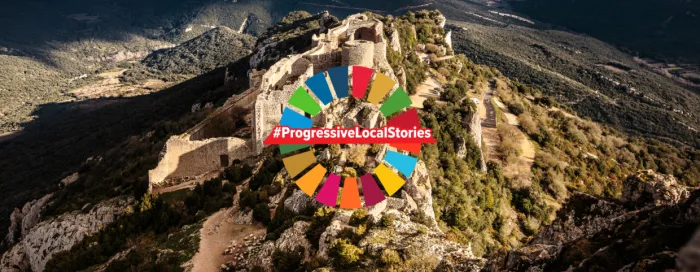This interview is part of our series “#ProgressiveLocalStories”, aiming at raising awareness on the many positive initiatives implemented by progressive cities and regions in Europe in relation to the Sustainable Development Goals. Cities and regions have become laboratories for innovative solutions and with this series we aim at discovering how progressive mayors, councillors, and presidents of regions put in place policies to tackle the climate crisis, eradicate social inequalities, and build more sustainable communities.
In what ways is the Aude Department progressive?
The Aude Department, which is in the heart of the Occitan region, is a land of human tradition that has been working for decades towards social and human progress. Our world is changing rapidly, and the local and regional authorities that I represent can play a part in this constant movement of evolution.
We are regularly confronted with the impacts of global warming, floods, fires and drought. They affect our territory and undermine sectors that are fundamental economically for the employment of our citizens (in areas like viticulture, tourism, etc.).
We also face difficulties in rural territories where population department services and access to citizens' rights need to be maintained. Some of the people in the rural territories live in very precarious conditions.
The Aude Departmen’s “sovereign” competency is human and territorial solidarity. This competency is fully included in the spirit and in the letter of the Sustainable Development Goals (SDGs) and of the Agenda 2030. You have for instance the “No Poverty” SDG 1 but also the “Good Health and Well-being” SDG 3, the “Quality Education” SDG 4, the “Clean Water and Sanitation” SDG 6 and the “Responsible Consumption and Production” SDG 12.
Thinking back, the Aude Department takes part in a majority of these objectives that all need to be pursued.
I noticed that it is often the most socially pressurised territories that are the most exposed to the challenges of sustainable development.
We must therefore show ingenuity and creativity in a context in which our intervention capacities are hampered nationally by the reduction of our resources and by a “Cahors pact” contract that prohibits us to increase our expenditure beyond 1.2 % (this is subject to penalty) even though our territory's needs are huge.
The Aude Department still achieves this, as it is crucial to maintain a high level of commitment in the policies of inclusion and energy transition, but it also contributes to the integration of a social and environmental dimension in the economic activity of our territory. We therefore articulate our territorial policies around the principles of sustainable development.
How are the Sustainable Development Goals (SDGs) concretely implemented in your department?
I will give you one example, among many others.
As part of a participatory approach associating the Aude’s citizens, our department has drawn up a local strategy to contribute to the Territorial Energy Climate Plan.

This has enabled us to set targets and operational measures as a basis for genuine local climate and energy policies and to raise awareness among citizens and local actors in the fight against climate change.
In order to achieve this, the Aude Department worked closely with elected representatives and inhabitants by mobilising and federating stakeholders (municipalities, EPCI, housing offices, NGOs, etc.) in a participatory and co-constructive approach to the strategy.
It both aims at:
- limiting the territory's impact on the climate by reducing greenhouse gas emissions in order to control energy demand, optimise non-energy emissions, increase energy efficiency and develop renewable energy;
- reducing the territory's vulnerability to climate change in order to anticipate different living conditions and manage economical, environmental, social, industrial and health risks.
This proactive action has been recognised as a “Positive Energy Territory for Green Growth” (“Territoires à Energie Positive pour la Croissance Verte” in French). A “mainstream” is being put into place gradually in the other implemented policies.
The inclusion policy thus integrates an axis linked to the energy transition, leading to the implementation of a general interest programme to combat energy poverty. The objective is to support the 27 000 households potentially affected by energy poverty.
This operation must also enable the elderly to stay at home, in articulation of and in complementarity with the measures related to the loss of autonomy.
How does Europe help make the Aude Department more sustainable?
Europe accompanies our department’s interventions with the ESIF, European Structural and Investment Funds.
The Aude Department manages the “ESF (European Social Fund) — inclusion” directly on its territory. It redistributes the ESF to all social cohesion stakeholders.
It also manages an extended global grant and guarantees that the ESF is involved in the entire territory, be it urban or rural. It is important to entrust this fund at local and community levels (as they are responsible for its inclusion) in order to be effective and visible!
This is the case in the Aude. Europe directly accompanies our policies and thus helps to improve the living conditions of our most vulnerable citizens.

Without the ESF’s intervention on the territory, innovations such as encouraging the economical reconciliation of social inclusion by developing social inclusion clauses in public procurement (a mechanism which allows working hours to be set aside for beneficiaries of social minima) would be much more difficult to achieve.
However, in the difficult context we are experiencing, we need to go even further. The Aude Department conducts for example strong policies of territory development through digitalisation and tourism. It also builds on its social and territorial solidarity competences. Europe supports these interventions through the ERDF, European Regional and Development Fund.
André Viola is President of the Aude Department (France) and member of the PES Group in the European Committee of the Regions since 2016.
**
Photo credit: Aude Department.
